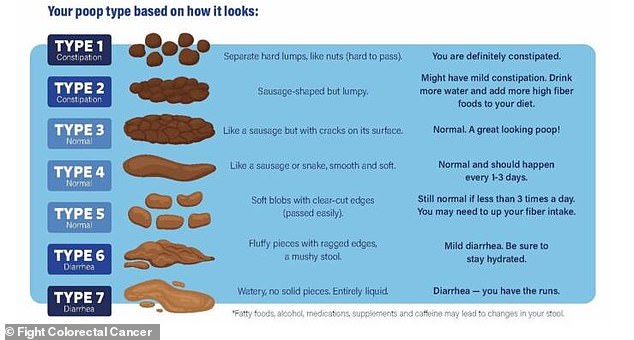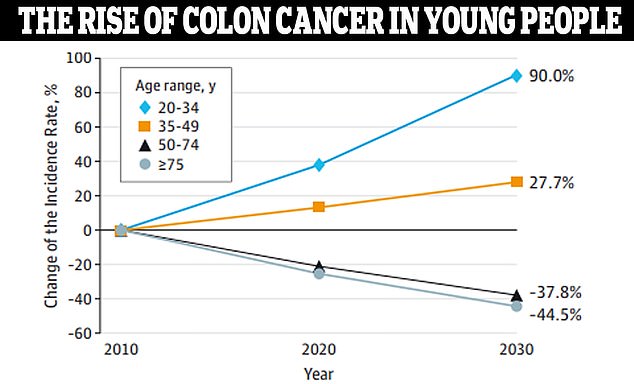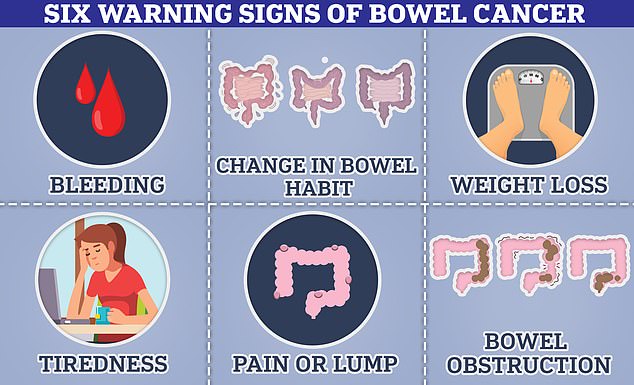Doctors warn that certain forms of stool, such as narrow stools, could be a sign of colon cancer.
Typically, a healthy number two is sausage-shaped and thin or covered in cracks on its surface.
However, while occasional narrow stools could just be a sign of constipation, they could also indicate chronic digestive problems such as irritable bowel syndrome (IBS), diverticulitis, and even cancer.
If you see blood on the toilet paper or in the bowl, this is a sign to call a doctor immediately, as problems can include hemorrhoids, Crohn’s disease, and cancer.
The warnings come as the United States faces an epidemic of young people diagnosed with colon cancer and experts are working to unravel the cause.

Experts warn that narrow, bloody stools could be a sign of colon cancer, which is increasing rapidly in the US.


Narrow stools may look like a tape or pencil.
More commonly, these can be a sign of constipation, which means passing stools less than three times a week or having difficulty passing stools.
Constipation is usually caused by lifestyle factors, such as not consuming enough fiber, not drinking an adequate amount of water, and not exercising regularly.
However, the nonprofit Fight Colorectal Cancer warns that narrow stools could also indicate IBS, a chronic disorder that causes abdominal pain, bloating, diarrhea, and constipation.
These can also indicate diverticular disease, which occurs when pouches develop in the walls of the intestine and become inflamed, causing the intestines to narrow.
Other signs of diverticular disease include pain in the lower left abdomen, changes in bowel habits, symptoms that worsen after eating and improve after defecating, and pain that worsens when pressure is placed on the stomach.
Additionally, Fight Colorectal Cancer states that watery stools can be a sign of blockages such as tumors.


Data from JAMA Surgery showed that colon cancer is expected to increase by 90 percent in people ages 20 to 34 by 2030. Doctors aren’t sure what is driving this mysterious increase.


Bowel cancer can cause blood in your stool, a change in bowel habit, a lump inside the intestine that can cause blockages. Some people also experience weight loss as a result of these symptoms.
‘In most cases, narrow bowel movements that occur infrequently are not a cause for concern. But if you experience ribbon-like bowel movements for more than a week, seek medical attention,” the charity states.
An alarming type of stool is blood on toilet paper, in stool, or in the toilet bowl. Fight Colorectal Cancer warns that “any amount of rectal bleeding is not normal and you need to find out why you are seeing blood in the toilet.”
The charity warns that blood in the stool is a common sign of bowel cancer, which is increasing around the world, especially in adults under 50.
Rates are expected to double among young people by 2030, and colorectal cancer is also expected to become the leading cause of cancer deaths in people under 50 by the end of the decade.
This is based on data from JAMA Surgerywhich found that between 2010 and 2030, colon cancer will have increased by 90 percent in people aged 20 to 34. Rectal cancer will have increased by 124 percent in the same age group.
The ACS estimates that about 153,000 cases of colorectal cancer will be detected in 2023, including 19,500 among those under age 50.
About 53,000 people are expected to die from the disease this year.
However, Fight Colorectal Cancer states that blood in stool is not always a sign of cancer.
If the blood is bright red, it means it is newer and has not traveled very far. Bright red blood usually comes from the lowest part of the colon, known as the sigmoid colon, which could be a sign of hemorrhoids.
Meanwhile, the darker, tar-like blood is older, indicating it comes from higher in the colon. This could be a sign of Crohn’s disease or ulcerative colitis, which causes inflammation in the gastrointestinal tract.
Stools covered in white or yellow mucus could also indicate Crohn’s disease, as well as infections such as salmonella.
Other changes in stool could indicate health problems other than cancer.
Floating stools, for example, simply mean that your body has too much gas.
This can happen after any sudden dietary change, such as adding foods like broccoli, beans, and lentils to your diet. Lactose may also cause excessive amounts of gas.
Floating poop could be related to a lack of bile, which the liver produces to filter waste such as toxins and excess cholesterol.
Lack of bile in the stool could be an indication of bile acid malabsorption. When bile is not absorbed properly, chemical imbalances occur that can eventually lead to diarrhea.
Colon cancer patients have also noticed that not all of their symptoms had to do with stool.
One Quora user, for example, said he “chewed a lot of ice.”
‘This was new to me. My doctor said it could be due to anemia, so he did a blood test. Yes, I had anemia,’ the user named Renee. wrote.
‘I wanted to know where my blood was going, so he suggested a colonoscopy. I didn’t get excited, but I said, “Okay.” The result was positive for rectal cancer.
